Donald Trump adviser: Secret warrant may have caught hacker contact
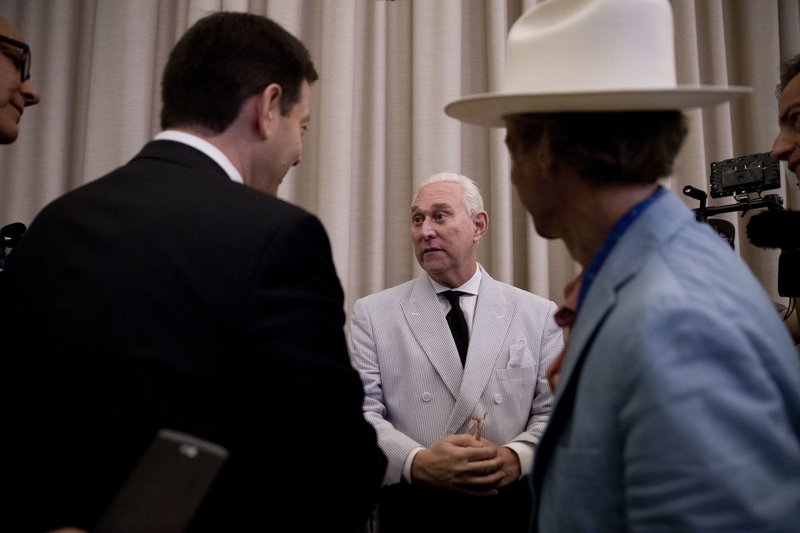
Longtime Trump adviser Roger Stone says he believes his contacts with a Russian-linked hacker who took credit for breaching the Democratic National Committee may have been obtained through a FISA warrant, which allows the government to collect the communications of individuals suspected of being agents of a foreign power. Stone is among a handful of President Donald Trump‘s associates who are under scrutiny for possible links to Russia during the presidential race. In a statement to The Associated Press, Stone said he’s retained two attorneys to explore whether he can compel the government to “either charge me or admit they have no case whatsoever.” The Republican operative has acknowledged having a Twitter exchange with Guccifer 2.0, a hacker that U.S. officials believe has ties to Russia. Stone said he was “unaware at the time of the brief exchange of allegations that the hacker in question is suspected of being a Russian asset.” “I have no relationship with the Russian state, Russian Intelligence or any other Russians,” said Stone, who split with Trump’s campaign in August 2015 but remains in touch with the president. Stone’s messages with Guccifer 2.0 were first reported by the website The Smoking Gun. He said the story contains information that “could only be learned by surveillance of my domain and eavesdropping on my e-mail, phone calls and texts.” “If these where obtained through a FISA warrant as I believe and the information was leaked to the Smoking Gun, that would constitute a felony,” Stone said. He also suggested, without evidence, the government had Trump under surveillance during the presidential campaign. Trump has accused former President Barack Obama of wiretapping the New York skyscraper where he lived and ran his campaign, though he has provided no evidence to support his explosive allegation. On Monday, the White House started softening Trump’s claims, with spokesman Sean Spicer saying the president was referring to general surveillance that may have been approved by the Obama administration. The FBI, as well as House and Senate committees, are investigating Russia’s interference in the 2016 election and possible contacts between Trump associates and Russians. Trump has asked the congressional committees also to investigate his wiretapping allegations, though the Justice Department missed a Monday deadline to provide evidence to the House committee. Sen. Lindsey Graham, R-S.C., says he’s waiting to hear from FBI Director James Comey whether a warrant was issued that would have allowed the Obama administration to tap Trump’s phones during the campaign. Graham says he asked Comey to answer by Wednesday and also to say whether the FBI is investigating Russian interference in the 2016 campaign. If Comey doesn’t comply, Graham says Congress “is going to flex its muscle.” “We’ll issue a subpoena to get the information, we’ll hold up the deputy attorney general’s nomination until Congress is provided with the information to finally clear the air as to whether there was ever a warrant issued against the Trump campaign,” Graham, who heads the Judiciary Committee’s crime and terrorism subcommittee, said Wednesday on NBC’s “Today” show. Republican Sen. John McCain has singled out Stone as a Trump associate who should answer questions about his ties to Russia. The Arizona lawmaker suggested in an interview Sunday with CNN that Stone may have ties to ousted Ukrainian President Viktor Yanukovych. Stone denied any connection to Yanukovych or his political party. Stone said he did work for a “small pro-Western splinter party” of Ukrainian politician Volydmyr Litwin, calling the effort to help win seats in parliament a “low budget operation.” Stone said he is willing to testify in any Senate hearings that occur “in public and not behind closed doors.” He’s retained former U.S. Attorney Kendall Coffey and South Florida lawyer Grant Smith to represent him. Last year, Coffey represented Trump campaign manager Corey Lewandowski when he was charged with simple battery after an altercation with a female reporter. The prosecutor later dropped the charges. Republished with permission of The Associated Press.
On Twitter, President Donald Trump says he will order an investigation into voter fraud
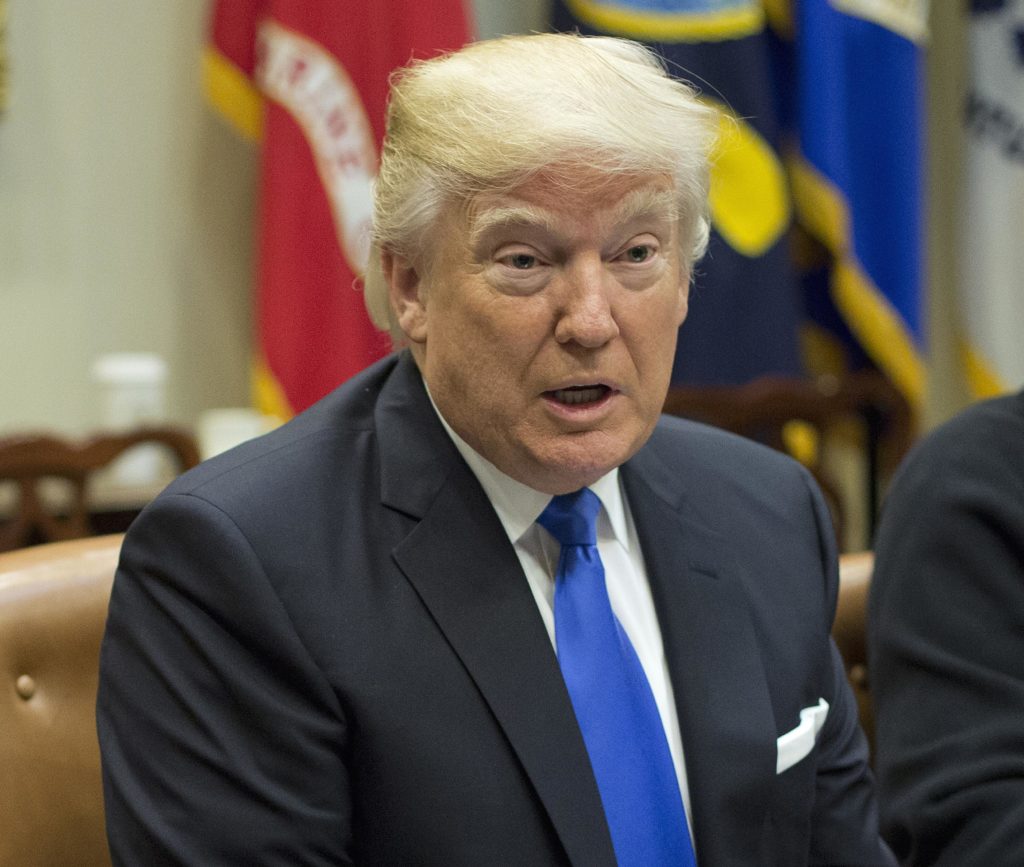
President Donald Trump says he will order an investigation into voter fraud. The president tweeted early Wednesday that the measures will affect those registered to vote in more than one state, “those who are illegal and even, those registered to vote who are dead (and many for a long time).” Trump says that “depending on results, we will strengthen up voting procedures.” Trump repeatedly made disputable claims of a rigged voting system before the election, but now in the White House, he continues to raise concern over fraud. Trump has been fixated on his loss of the popular vote in the election and a concern that the legitimacy of his presidency is being challenged by Democrats and the media, aides and associates say. Trump’s own attorneys dismissed claims of voter fraud in a legal filing responding to Green Party candidate Jill Stein‘s demand for a recount in Michigan late last year. “On what basis does Stein seek to disenfranchise Michigan citizens? None really, save for speculation,” the attorneys wrote. “All available evidence suggests that the 2016 general election was not tainted by fraud or mistake.” Secretaries of state across the country have dismissed Trump’s voter fraud claims as baseless. After the president’s morning tweets, Ohio Secretary of State Jon Husted wrote on Twitter, “We conducted a review 4 years ago in Ohio & already have a statewide review of 2016 election underway. Easy to vote, hard to cheat.” Trump’s exaggerations about inauguration crowds and assertions about illegal balloting have been distractions as advisers’ have tried to launch his presidency with a flurry of actions on the economy. His spokesman, Sean Spicer, has twice stepped into the fray himself, including on Tuesday, when he doubled down on Trump’s false claim that he lost the popular vote because 3 million to 5 million people living in the U.S. illegally cast ballots. All 50 states and the District of Columbia have finalized their election results with no reports of the kind of widespread fraud that Trump is alleging. “He believes what he believes based on the information he was provided,” said Spicer, who provided no evidence to back up the president’s statements. If the president’s claim were true it would mark the most significant election fraud in U.S. history — and ironically, would raise the same questions about Trump’s legitimacy that he’s trying to avoid. Rep. Elijah Cummings, ranking Democrat on the House Oversight and Government Reform Committee, said Wednesday his panel has already sent letters to the attorneys general in all 50 states asking for reports of any election irregularities. “The president can join me and my staff,” Cummings said on MSNBC. He also said he wants Congress to restore voting protections, citing a Supreme Court ruling that “gutted” key sections of the Voting Rights Act, particularly the provision requiring southern states to get clearance in advance from the Justice Department before legislating changes in voting laws and procedures. Some Trump allies say he is justified in using his platform to defend his standing. They point to Georgia Democratic Rep. John Lewis‘ pre-inauguration statement that he did not see Trump as a legitimate president, as well as U.S. intelligence agencies’ assessment that Russia meddled in the election in order to help Trump win. “Segments of his own government keep driving this narrative,” said Roger Stone, a longtime confidant. “I don’t think it hurts to point it out.” Key advisers in Trump’s inner circle concede the focus on crowd claims and alleged voter fraud have been a distraction. After Friday’s inaugural festivities, the new president grew increasingly upset the next day by what he felt was “biased” media coverage of women’s marches across the globe protesting his election, according to a person familiar with his thinking. Trump was particularly enraged with CNN, which he thought was “gloating” by continually running photos of the women’s march alongside the smaller crowds that attended his inauguration the day before, according to this person, one of several White House aides and associates who spoke on the condition of anonymity because they were not authorized to speak publicly about private conversations. Tuesday night on Twitter, Trump slammed CNN again, referring to the network as “FAKE NEWS @CNN” while praising rival Fox News Channel. Trump has had a tumultuous relationship with the press, frequently calling the media dishonest and insulting individual reporters by name at his rallies and on Twitter. Still, two people close to Trump said he expected his coverage to turn more favorable once he took office. Instead, he’s told people he believes it’s gotten worse. The bad press over the weekend has not allowed Trump to “enjoy” the White House as he feels he deserves, according to one person who has spoken with him. The result has been a full display of Trump’s propensity for exaggeration and more. During an appearance at the CIA Saturday, he wrongly said the inaugural crowds gathered on the National Mall stretched to the Washington Monument, despite clear photo evidence to the contrary. And during a reception with lawmakers from both parties Monday night, he repeated his false assertion that millions of illegal immigrants provided Hillary Clinton‘s margin in the popular vote. Republished with permission of The Associated Press.
Top Hillary Clinton aide links Roger Stone to Russian email hacking
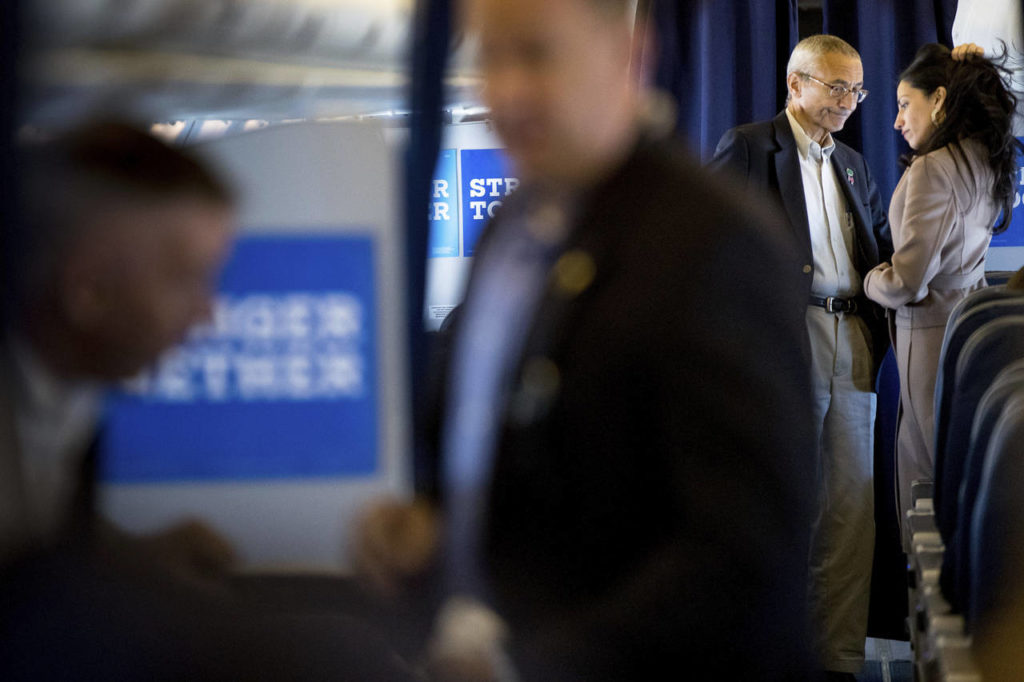
Hillary Clinton‘s top adviser said the FBI is investigating Russia’s possible role in hacking thousands of his personal emails, an intrusion he said Donald Trump’s campaign may have been aware of in advance. If true, the assertion from Clinton campaign chairman John Podesta would amount to an extraordinary link between Russia and an American presidential campaign. Podesta said the alleged ties could be driven either by Trump’s policy positions, which at times echo the Kremlin, or the Republican’s “deep engagement and ties with Russian interests in his business affairs.” To Podesta, the central figure in the swirling controversy is longtime Trump adviser Roger Stone, who has said he has been in touch with WikiLeaks founder Julian Assange. Podesta also raised as evidence an August tweet in which Stone said Podesta’s “time in the barrel” was coming. The tweet was sent shortly after WikiLeaks published scores of hacked emails from other Democratic officials. “I think it’s a reasonable assumption, or at least a reasonable conclusion, that Mr. Stone and the Trump campaign had advance warning about what Assange was going to do,” Podesta told reporters aboard the Clinton campaign plane. Podesta acknowledged the evidence was “circumstantial.” Stone, in an email to The Associated Press late Tuesday, said Podesta’s accusations were “categorically false” and “without foundation.” WikiLeaks tweeted Wednesday that it “has had no contact with Roger Stone.” Podesta said the FBI contacted him over the weekend and confirmed it was investigating the hacking of his account as part of the ongoing probe in other Democratic Party hackings by groups with Russian ties. Last week, intelligence officials said they believed the individuals responsible are working for Russian intelligence and coordinating with Assange on the political hacking. Russian Ambassador to the U.S. Sergey Kislyak dismissed the accusations as untrue. “We are watching very carefully the election campaign in this country,” Kislyak said Tuesday at a discussion of bilateral affairs at Johns Hopkins University’s campus in Washington. “We don’t interfere (in) the internal affairs of the United States, neither by my statements nor by electronic or other means.” Clinton has repeatedly accused her opponent of being soft on Russia, pointing to his praise of Russian President Vladimir Putin as a strong leader, his suggestion that he would rethink sanctions against Russian officials, his sharp criticism of NATO and other policy positions. While Podesta didn’t directly accuse Trump of assisting in any Russian meddling with American campaigns, he suggested Trump was either “willfully ignoring” intelligence officials’ warnings about Russian government involvement or “an unwitting agent of the Russian Federation.” The Clinton campaign would not confirm the authenticity of Podesta’s leaked emails, noting that Russian hackers often fabricate documents. “The pattern is they hack, they leak truthful things, and then they build up to leaking documents that are either doctored or wholly fabricated,” said Jennifer Palmieri, Clinton’s communications director. Trump seized on the hacked emails at a rally Tuesday night in Florida, alleging the documents show that “Clinton is the vessel (of) a corrupt global establishment that’s raiding our country and surrounding the sovereignty of our nation.” Also citing WikiLeaks, Trump said: “The Department of Justice fed information to the Clinton campaign about the email investigation so that the campaign could be prepared to cover up for her crimes. What is going on?” In May 2015, Clinton spokesman Brian Fallon alerted staffers that the Justice Department was proposing to publish Clinton’s work-related emails by January in response to requests by news organizations. Fallon, a former Justice Department spokesman, wrote that unspecified “DOJ folks” told him there was a court hearing planned soon in the case. The dates of court hearings would have been publicly posted in advance on the court’s docket. Fallon did not respond to a request for comment from AP. The Justice Department declined to discuss Fallon’s email. Still, Trump said, “This is collusion and corruption of the highest order and is one more reason why l will ask my attorney general to appoint a special prosecutor,” following up on his debate threat to put Clinton in jail. WikiLeaks dropped the first batch of Podesta’s emails shortly after news organizations released a video in which Trump is heard making sexually predatory comments about women. That video has deeply damaged Trump’s campaign, leading several Republicans to revoke their support for the businessman. Podesta said Tuesday the timing of his emails’ release was an “awfully curious coincidence.” “Mr. Assange wanted to change the subject,” Podesta said. “He didn’t succeed in doing that.” Republished with permission of the Associated Press.
Donald Trump has a ‘plan B’ for convention – outside help
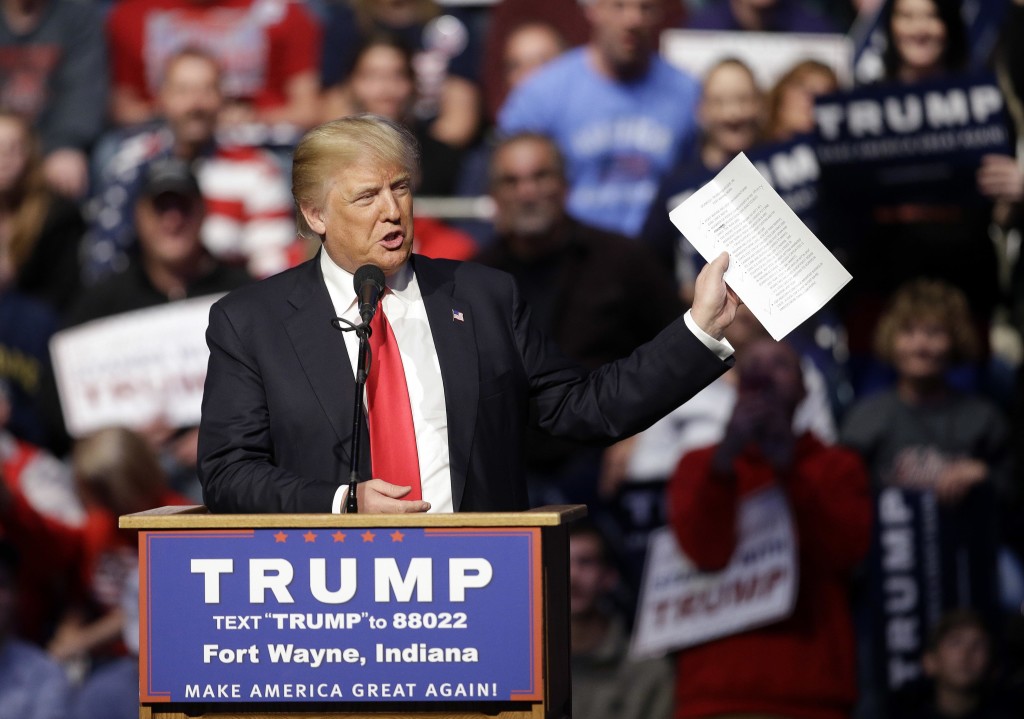
Donald Trump has a Plan B if he’s faced with a contested convention, and it involves the sort of outside groups that he’s called “corrupt.” While the billionaire businessman might lock up the Republican presidential nomination in the next five weeks of voting, he and his allies are simultaneously undertaking a parallel effort in case he falls short. Outside groups, including one led by longtime Trump political ally Roger Stone, and a loose collection of colorful supporters such as “Bikers for Trump” are organizing ahead of the July convention in Cleveland. They’re soliciting money to pay for their transportation and housing, and they’re already trying to influence the mood of the convention with a social media campaign saying that anything short of a Trump nomination would be “stealing.” “Our principal focus right now is Cleveland,” Stone said of his group, called Stop the Steal. “We want to bring as large a contingent as possible to demonstrate the breadth of Trump’s appeal so that the party can see graphically what they’re going to lose if they hijack the nomination from him.” Stop the Steal and other groups are gaining steam even though Trump has insisted he wants no donor help for his bid and is beholden to no one. Super political action committees “are a disaster, by the way, folks,” Trump said at a Republican debate in March. “Very corrupt.” Stop the Steal is not technically a super PAC, but it operates under very similar rules. This past week, Trump’s lawyers sent the Federal Election Commission a letter renewing the campaign’s disavowal of groups using his “name, image, likeness, or slogans in connection with soliciting contributions.” All the groups planning Cleveland activities repeatedly use his name in their literature. Trump set the stage for what the outside groups are doing by making provocative comments about the complex way Republicans pick a nominee — “rigged,” he calls it. Voters weigh in, but each state has its own rules about what delegates go to the convention and how they must vote on a presidential candidate while they’re there. Stop the Steal and other Trump fans are pushing a similar message on social media and websites. “The big steal is in full swing,” one online letter says, calling unfriendly delegates “stooges.” The Stone-led Cleveland coalition includes We Will Walk, Bikers for Trump, Citizens for Trump and Women for Trump. Stone said the goal is to bring thousands of people to march peacefully in the streets. “We are prepared to bring the Republican Party down if they mess with Trump and try to take it away from him by doing the dirty tricks,” said Paul Nagy, a New Hampshire Republican. He runs We Will Walk, a group that has collected more than 41,000 online signatures of people who say Trump deserves the nomination. The public relations offensive is a counterpart to GOP rival Ted Cruz‘s carefully crafted, labor-intensive strategy of recruiting friendly delegates in hopes he can win if Trump falls short on the first ballot of voting. This weekend in Arizona, Cruz won another strategic victory over Trump, getting numerous friendly delegates elected to head to Cleveland while the Trump backers appeared to be virtually shut out. Those delegates are required to first vote for Trump at the convention because he won the state, but they could later switch their votes to Cruz. While Cruz is playing within the party’s rules, Trump’s claim that what Cruz is doing amounts to “stealing” resonates with voters. In mid-April, after Cruz swept Colorado’s elected delegates, stay-at-home mom Erin Behrens said she felt sick about what was happening to her candidate. So Stop the Steal helped her organize protests in the state. Stone and an ally, Greg Lewis, flew in to help Behrens answer email and arrange a rally. At the April 15 event in Denver, about 200 demonstrators waved banners that read “Banana Republicans” and chanted “Stop the Steal!” Behrens said in an interview last week that she’s continuing to organize Trump supporters in Colorado. “If there’s funny business and they make it clear they’re going to not give it to Trump, Stop the Steal Cleveland will be one thing,” she said. “But we will have protests, events across the United States. Count on it.” A good chunk of what the outside groups are doing now is fundraising. “Bottom line we need to raise $262,000 in the next two weeks,” Stop the Steal’s website says. “If you can’t make it to Cleveland will you help those who can? Will you send $500, $200 or even $100 to this crucial effort?” A different pro-Trump group, Great America PAC, also is raising money for a Cleveland effort. This one is led by William Doddridge, chief executive officer of the Jewelry Exchange. Its commercials warn that “party elites” will try to seize the nomination from Trump at the convention and suggest that people stop that from happening by calling an 800 number and giving money. It needs the help. The group’s latest fundraising report, covering through the end of March, shows it is more than $600,000 in debt. The super PAC can take unlimited contributions from individuals, corporations and unions. Trump’s lawyers have specifically asked it to cease operations. Stop the Steal isn’t a super PAC, the category of outside group that attracts the most ire from Trump, Stone said. But it’s a distinction without a difference. It is organized as a political nonprofit “527” group that files periodic disclosure reports about its donors and spending with the Internal Revenue Service rather than the Federal Election Commission. Like an FEC-monitored super PAC, a 527 can take unlimited amounts of money from individuals, corporations and unions. Republished with permission of the Associated Press.
Darryl Paulson: The zenith of Donald Trump
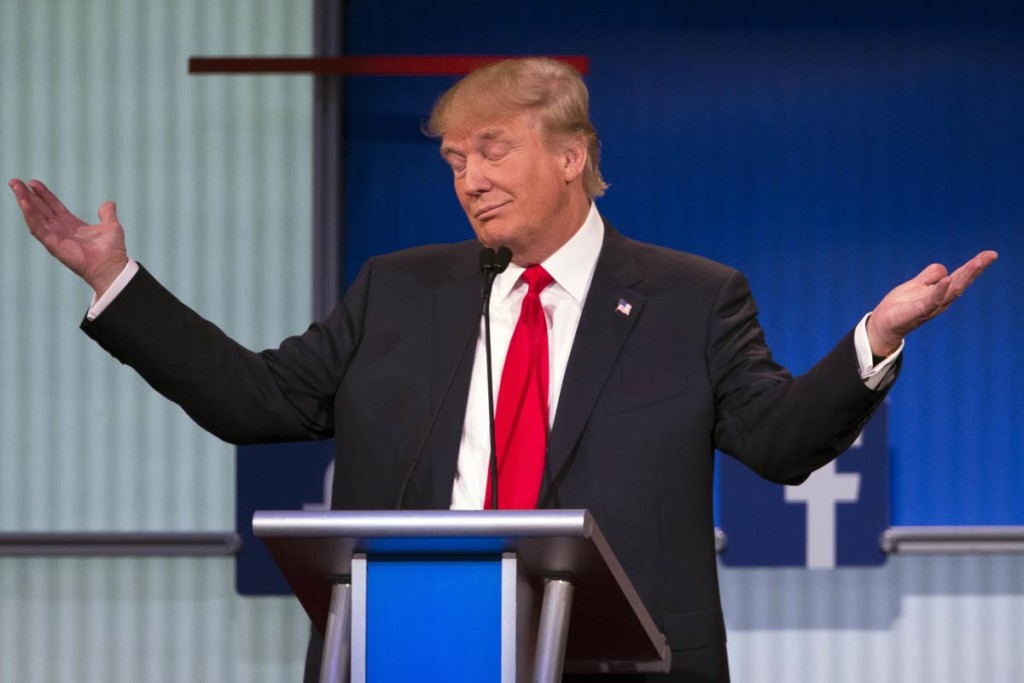
Here are two critical points concerning Donald Trump. First, he is barely a Republican. Second, he is certainly not a conservative. It is obvious that Trump is leading the field of 17 Republican candidates. His support in four recent polls all had Trump in first place, ranging from a low of 21 percent in the Bloomberg poll to 26 percent in both the Fox poll and the Monmouth University poll. That’s the good news for Trump. The bad news is that Trump may move up a few points, but he has reached the zenith of his support. A recent Economist/YouGov.com survey found that about a third of Americans had a favorable view of Trump and 58 percent had an unfavorable view. Trump will soon be taking the “down” elevator in public opinion polls. The same poll found that when the numbers were broken down by age, race, region, gender and income, Trump’s unfavorables were substantially higher in every category but one: voters 65 and older. His support among African-Americans, Hispanics and women is almost nonexistent. A Rasmussen Poll released Tuesday found strong evidence that the Trump decline may have already started. A survey of 651 likely Republican voters conducted between Sunday and Monday, found that support for Trump has declined from 24 percent to 17 percent in the past 10 days. Trump’s support among men has fallen from 30 percent to 19 percent, and support from women has dropped from 22 percent to 14 percent. Trump is at the top right now because he is perceived as the non-politician in the age where Americans of all political stripes hate the establishment. Voters are frustrated and alienated with politics and politicians, and Trump has successfully appealed to them. Trump’s supporters see him as the outsider who will shake-up the system, much like those who supported George Wallace and Ross Perot were viewed as political mavericks. Trump’s one major contribution to the presidential race us that he has demonstrated to the other candidates that the voters do not like them and their hollow promises one bit. Trump will falter for many reasons. As Larry Thornberry has written in The American Spectator, a leading conservative publication, Trump is “an arrogant, self-satisfied, crude and pompous windbag and bully who grossly overestimates his knowledge, his successes, and, not the least, his charm.” He attacks any critic as “stupid” or “loser,” but has a political glass jaw when he is criticized. Trump will lose because he is running as a Republican this year simply because he feels like it. He quit the party in 1999 saying that “Republicans are just too crazy right.” He then hired Roger Stone, who resigned as Trump’s campaign manager a few days ago, to consider a 2000 run as a Reform Party candidate. In 2009, Trump was back as a Republican. The next year he decided he was an independent and then in 2012, he was once again a Republican. His moving from one political party to another, all for political expediency, might remind Florida voters of Gov. Charlie Crist. Trump is the Bernie Sanders of the Republican Party. Both Trump and Sanders are running to lead a party that neither really calls home and that both have spent more time disparaging than uplifting it. During most of the first decade of the 21st century, the vast majority of the $1.5 million that Trump donated to political candidates went to Democrats, including contributions to Nancy Pelosi and $100,000 to the Clinton Foundation. When asked about his contributions to both Democrats and Republicans, Trump justified them by saying, “When you give, they do whatever you want them to.” I am sure that will appeal to Americans who hate politics for precisely that reason. Trump will lose because he is not a conservative in a party that is dominated by conservatives. In a 2000 book Trump called himself a “liberal” on health care. He supported a single-payer health plan that conservatives loathe, and he was once pro-choice, although he now says he is against abortion. A few years ago, Trump supported a 14.25 percent mega-tax on those making more than $10 million. Now he wants to cut income taxes in half. As Bruce Bartlett, former aide to U.S. Rep. Jack Kemp, said of Trump: “He is nothing if not inconsistent. He’s been on every side of every issue from every point of view as far as I can tell.” If you have not noticed, Trump is also delusional. He calls immigrants “rapists and murderers,” and then says he will win the Hispanic vote. He insults conservative icon Megyn Kelly for attacking him unfairly and having blood coming out her eyes and “whatever.” Trump also believes he will win the votes of women. Republicans, conservatives and Americans deserve better than Trump. “Donald, you’re fired!” Darryl Paulson is Professor Emeritus of Government at the University of South Florida St. Petersburg and resides in Palm Harbor.
Ex-Donald Trump aide still supports businessman’s White House race
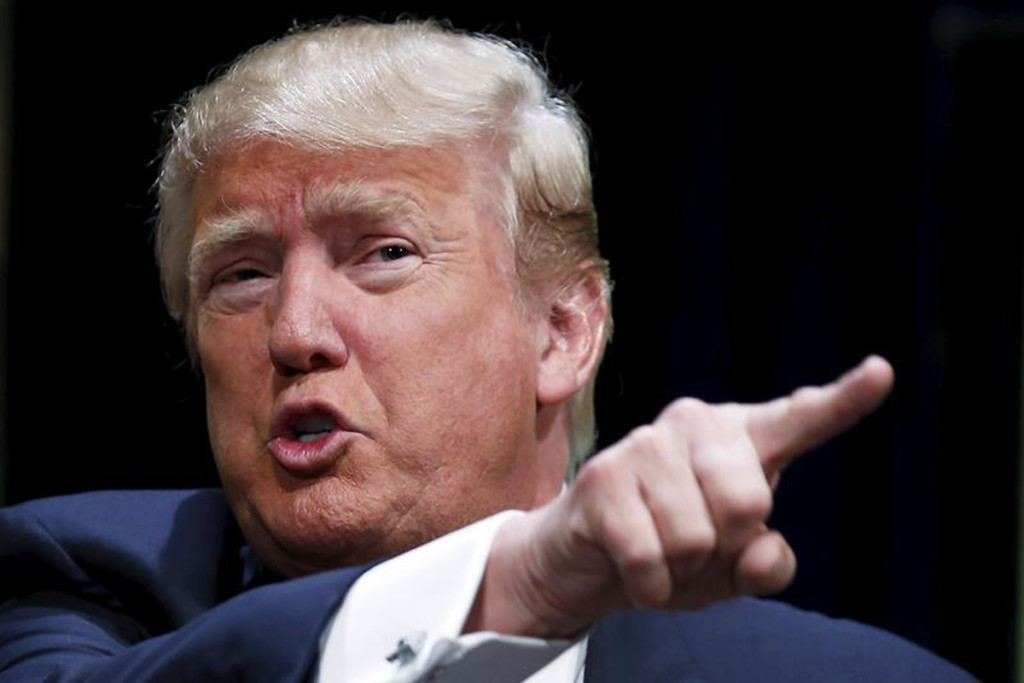
A former adviser who says he quit Donald Trump‘s presidential campaign is calling the billionaire real estate mogul the best bet to shake up a “broken” U.S. political system. Roger Stone says he resigned because he felt Trump was getting too distracted by marginal issues like his feud with Fox News personality Megyn Kelly. There have been conflicting reports about the circumstances surrounding Stone’s departure, including contentions by the campaign that he was fired. Yet Stone, who’s consulted eight presidential campaigns, says he supports Trump. He tells NBC’s Today show Tuesday that Trump is the only candidate who “has the gumption and independence” to shake up the system. Stone adds that he wishes Trump would give more attention to “big-picture issues,” in the style of former President Ronald Reagan. Republished with permission of the Associated Press.


